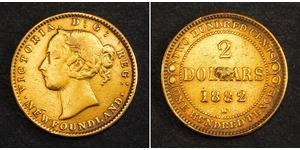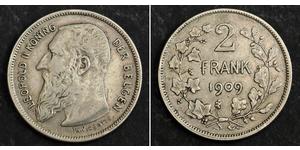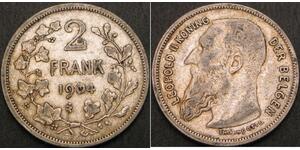12 Sol Kingdom of France (843-1791) Silver Louis XV of France(171 ...
1764, Royal France, Louis XV. Silver 12 Sols (1/10 Ecu) Coin.
Mint year: 1764
Mint Place: Montpellier (N)
Denomination: 12 Sols (1/10th Ecu)
References: Gadoury 292, KM-511.1.
Diameter: 21mm
Material: Silver
Weight: 2.78gm
Obverse: Head of Louis XV left.
Legend: LUD . XV . D . G . FR . ET NAV . REX .
Reverse: Crown above oval with three fleur de lis inside, flanked by olive branches.
Legend: SIT NOMEN DOMINI (N) BENEDICTUM (privy mark?) I764
Translated: "Blessed be the name of the Lord!"
Louis XV (Versailles, 15 February 1710 – Versailles, 10 May 1774) ruled as King of France and of Navarre from 1 September 1715 until his death on 10 May 1774. Coming to the throne at the age of five, Louis reigned until 15 February 1723, the date of his thirteenth birthday, with the aid of the Régent, Philippe, duc d’Orléans, his great-uncle, thereafter taking formal personal control of government.
Unexpectedly surviving the death of most of the royal family, he enjoyed a favourable reputation at the beginning of his reign and earned the epithet "le Bien-Aimé" (“the Beloved”). However, in time, his lack of morals, general inability to effectively reform France and the Monarchy, and the perceived failings of his foreign policy lost him the affection of his people, and he ended his life amongst the most unpopular kings of France.
While historians have traditionally treated Louis XV harshly, more recent research has suggested that he was in fact very intelligent and dedicated to the task of ruling the largest state in Europe, bar Russia. His nagging indecision, fueled by his awareness of the complexity of problems ahead, as well as his profound timidity, hidden behind the mask of an imperious king, may account for the poor results achieved during his reign. In many ways, Louis XV prefigures the “bourgeois rulers” of the romantic 19th century. While dutifully playing the role of the mighty king carved out by his predecessor and great-grandfather, Louis XIV, Louis XV in fact cherished nothing more than his private life far away from the pomp and ceremony of Court. Having lost his mother while still little more than an infant, he longed for a reassuring and motherly presence, which he tried to find in the intimate company of women, something for which he was much criticized both during and after his life.
| 1 | 2 |
|---|
(1500 X 738 pixels, file size: ~201K)
Posted by: anonymous 2019-03-25
Frankreich. Ludwig XV. 1715-1774. 1/10 Ecu 1766 A, Paris. Gadoury 292. Schöne Patina. Vorzüglich +
(740 X 375 pixels, file size: ~59K)
Posted by: anonymous 2020-11-12
1759,Frankreich. Ludwig XV. 1715-1774. 1/10 Ecu au bandeau 1759 D. Gadoury 292, Duplessy 1683. Schöne Patina. Sehr schön - vorzüglich.
(740 X 361 pixels, file size: ~59K)
Posted by: anonymous 2020-11-12
1753,Frankreich. Ludwig XV. 1715-1774. 1/10 Ecu au bandeau 1753 W. Gadoury 292, Duplessy 1683. Schöne Patina. Sehr schön - vorzüglich.
(900 X 448 pixels, file size: ~93K)
Posted by: anonymous 2015-11-25
Frankreich 1/10 Ecu au bandeau 1766 L, Bayonne. Gadoury 292, Duplessy 1683. Schöne Patina. Sehr schön +
(1445 X 732 pixels, file size: ~162K)
Posted by: anonymous 2015-05-01
1749,FRANCE. 12 Sols (1/10 Ecu), 1749-A. Louis XV (1715-74). NGC MS-63.KM-511.1; Gad-292. Well struck. Attractive toning.
(1445 X 732 pixels, file size: ~162K)
Posted by: anonymous 2015-05-01
1749,FRANCE. 12 Sols (1/10 Ecu), 1749-A. Louis XV (1715-74). NGC MS-63.KM-511.1; Gad-292. Well struck. Attractive toning.
|
2 Dollar Canada Gold Victoria (1819 - 1901)
group has 39 coins / 38 prices
⇑
2 Franc Belgium Silver Leopold II of Belgium(1835 - 1909)
group has 7 coins / 7 prices
⇑

-500-250-zfHBwcI0xXMAAAEo9DH7lKuP.jpg)
-300-150-dW_ZGYbcNdcAAAFp_t2Zt7b3.jpg)
-300-150-Q01_dbXUgW8AAAF1Qw_iU7o9.jpg)
-300-150-Xgd_dbXUD1gAAAF1TALiU7o9.jpg)
-300-150-6fUKbzbiHjMAAAFROkFauz03.jpg)
-300-150-GiIKbzbiZ3QAAAFNv15tvxBK.jpg)
-300-150-4HMKbzbiMvYAAAFN0tJtvwzO.jpg)















